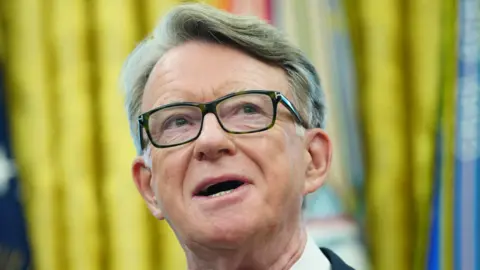In a recent interview, Lord Mandelson, the newly appointed Ambassador of the UK to the United States, expressed optimistic views regarding the recent trade deal between the UK and the US. He characterized the agreement as a “platform for going further” and emphasized the opportunities it creates for expanding trade between the two nations. This statement marks Mandelson’s inaugural discourse following his appointment, a role he assumed in February of the year. His insights were shared during an episode of the BBC’s Newsnight, where he outlined his commitment to further negotiations aimed at reducing tariffs, which he believes will benefit both countries.
The backdrop of this renewed collaboration stems from a history of trade tensions, notably those initiated by former President Donald Trump. Earlier this year, Trump had imposed hefty tariffs on several British goods, including cars, steel, and aluminum. However, the recent deal appears to have alleviated some of those pressures by either reducing or removing these tariffs. Consequently, as of last Thursday, the US government relaxed restrictions, allowing certain quantities of British steel and aluminum to enter the US tariff-free and decreasing levies on specific British car exports.
While this trade deal is a significant step toward normalization, Lord Mandelson noted that ongoing discussions are necessary to explore and address other trade-related issues. One specific area that has emerged in recent discussions is the UK’s Digital Services Tax (DST). This tax, set at 2%, generates approximately £800 million annually, primarily from American tech companies. Despite discussions surrounding the DST during the latest negotiations, Mandelson clarified that its abolition was not included in this trade agreement. He stated that if the US wishes to revisit the topic, it would be open for discussion but they had not found an acceptable resolution during the recent talks.
Adding to the complexity of US-UK relations, White House Trade Adviser Peter Navarro has publicly stated that the Trump administration continues to advocate for the UK to remove the Digital Services Tax, labeling it a “bad virus.” This friction highlights ongoing challenges in achieving a comprehensive trade understanding, with heightened emphasis on the DST being a critical aspect of the bilateral dialogue.
In his remarks, Lord Mandelson also provided insight into the dynamics of the relationship between Prime Minister Sir Keir Starmer and President Trump. While acknowledging that the two leaders are “not cut from the same cloth,” he pointed out their shared commitment to advocating for their respective national interests. He remarked on how they manage to navigate their differences and engage in candid discussions to achieve mutual goals effectively.
The ambassador articulated a sense of optimism, explaining that Starmer’s leadership would ultimately be beneficial for the UK on the global stage. He portrayed Starmer as someone who would fiercely defend Britain’s interests while fostering solid relationships with allies. Recalling the feedback he’s received from fellow ambassadors in Washington, Mandelson noted a wave of congratulatory messages that reflected envied opportunities afforded to the UK through the new trade deal.
As the dialogue surrounding trade continues, Mandelson’s interactions with President Trump appear to have fostered a strong relational foundation. Reflecting on their first encounter, he recounted how Trump complimented his appearance, setting a personable tone for their relationship. He characterized Trump as someone who values authenticity, placing importance on merit-based assessments.
In conclusion, Lord Mandelson’s comments indicate a pivotal moment for UK-US trade relations, opening doors for further cooperation while navigating the complexities introduced by tariffs and taxes. Both countries are poised for extensive negotiations that could lead to greater mutual economic benefit, contingent upon effective communication and strategic alignment of interests. The optimism from the UK ambassador encapsulates an important period for international diplomacy, as nations seek to establish lucrative trade partnerships amidst a changing global landscape.



